Related Research Articles

Benjamin David Goodman was an American jazz clarinetist and bandleader known as the "King of Swing".
Floyd Sherman Chalmers, was a Canadian editor, publisher and philanthropist.
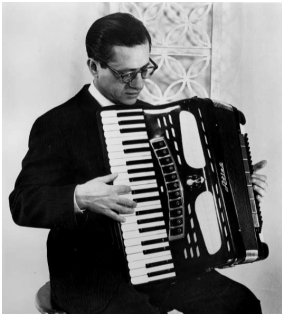
John Serry Sr. was an American concert accordionist, arranger, composer, organist, and educator. He performed on the CBS Radio and Television networks and contributed to Voice of America's cultural diplomacy initiatives during the Golden Age of Radio. He also concertized on the accordion as a member of several orchestras and jazz ensembles for nearly forty years between the 1930s and 1960s.

Lieutenant Colonel John Bayne Maclean was a Canadian publisher. He founded Maclean's Magazine, the Financial Post and the Maclean Publishing Company, later known as Maclean-Hunter.
The 500-seat Imperial Room is a major events venue at the Royal York Hotel in Toronto, Ontario, Canada. The hall is located on the lobby level of the hotel and has hosted major events, such as addresses to the Empire Club of Canada, but was more important historically a famous nightclub-dinner club.
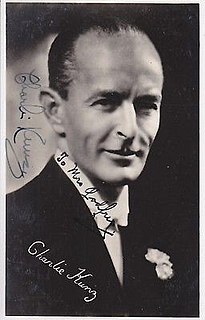
Charles Leonard Kunz was an American-born British musician popular during the British dance band era, and who became a pianist.
Sidney Torch MBE was a British pianist, cinema organist, conductor, orchestral arranger and a composer of light music.
Herbert Martin Kenney C.M. was a Canadian jazz musician and bandleader of Mart Kenney and His Western Gentlemen.
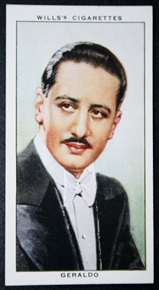
Gerald Walcan Bright, better known as Geraldo, was an English bandleader. He adopted the name "Geraldo" in 1930, and became one of the most popular British dance band leaders of the 1930s with his "sweet music" and his "Gaucho Tango Orchestra". During the 1940s, he modernized his style and continued to enjoy great success.
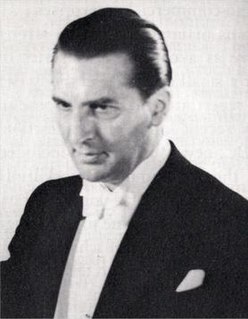
Stanford Robinson OBE was an English conductor and composer, known for his work with the BBC. He remained a member of the BBC's staff until his retirement in 1966, founding or building up the organisation's choral groups, both amateur and professional.

Mansel Treharne Thomas, was a Welsh composer and conductor, who worked mainly in South Wales. He was one of the most influential musicians of his generation, known as a composer, conductor and adjudicator. He was for many years employed by the BBC and promoted the careers of many composers and performers. He himself wrote vocal, choral, instrumental, band and orchestral music, specialising in setting songs and poetry. Many of his orchestral and chamber music pieces are based on Welsh folk songs and dances.
John Wesley Vivian "Jack" Payne was a British dance music bandleader who established his reputation during the British dance band era of the 1930s.
Johnny Douglas was an English composer, musical director and string arranger, perhaps best known for his work in the easy listening genre. He recorded over 500 tracks for DECCA and over 80 albums for RCA, and wrote the soundtrack to the 1970 film The Railway Children, plus 37 other feature films.

Jiří "George" Traxler was a Czech Canadian jazz and swing pianist, composer, lyricist and arranger, and was considered a founder and co-creator of the swing music era in Czechoslovakia. He was the last surviving collaborator of the renowned Czech pre-war composer Jaroslav Ježek. In 1951 he emigrated to Canada, and lived with his wife, Jarmila, in Edmonton until his death in the summer of 2011.
Paul Douglas Freeman was an American conductor, born in Richmond, Virginia.
Brian Jackson is a British-Canadian conductor, organist and pianist. He became a naturalized Canadian citizen in 1974. Until 2012 he was Principal Pops Conductor of the Kitchener-Waterloo Symphony, Orchestra London, and the Victoria Symphony.
Scott Tannas is a Canadian Senator and, since November 5, 2019, interim leader of the Canadian Senators Group, a parliamentary caucus.

Blondie Goes Latin, also known as Conga Swing, is a 1941 American comedy film directed by Frank R. Strayer and Robert Sparks and starring Penny Singleton, Arthur Lake, and Larry Simms. It is the eighth of the Blondie films. The film showcases musical numbers of Kirby Grant, Ruth Terry, Tito Guizar, with Arthur Lake displaying his drum skills, Penny Singleton her singing and dancing prowess.
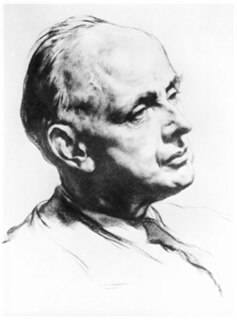
Edgar Kendall Taylor CBE, FRCM, Hon FRAM was a British pianist, who had an international career as a solo concert pianist. In the United Kingdom, he was well known for his concerts, which were broadcast on the BBC. He was also known for his recitals and broadcasts to the troops during World War II through the Entertainments National Service Association. He also had a career as a teacher and pedagogue.
Gregory Bowen is a Welsh trumpet player. His primary work was done in London before relocating to Berlin, Germany in 1976. Since 1961, Bowen has performed and recorded with jazz, pop artists and entertainers from Europe and North America on records, soundtracks and T.V. broadcasts. Most notable is his lead trumpet work on the James Bond film soundtracks Goldfinger, Thunderball and You Only Live Twice.
References
- 1 2 "Famed British Pianist Returns with a New Album," Toronto Star, Aug. 19, 1998.
- ↑ “Swing High” by Allan Wood – Dustymusic.com Retrieved Oct. 11, 2012
- 1 2 "Stop This Swing, I Want To Get Off," Maclean-Hunter Newsweekly, May 11, 1974.
- 1 2 3 Steinlerin, Deddeda. "Getting Back to Swing: Publisher Returns to His First Love Playing Music," The Victoria Times Colonist, May 14, 2004.
- 1 2 3 Gerwing, Jim. "Play it Again, Allan," The Beacon (Victoria, BC), June 11, 2004.
- ↑ "Singleton-Wood Magical Media Machine" (editorial), Maclean-Hunter 100th Anniversary Special Edition, January 1987, p. 88.
- ↑ "Special Report: Congress of Traditional Anglican Church, Victoria, British Columbia," Virtue Online, June 2011.